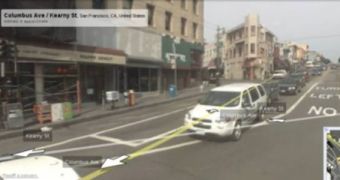The Google search giant has been recently asked to remove some photos from its new UK Street View Service, on account of the fact that some of the citizens depicted in those images were not about to let themselves become the laughing stock of the Internet, or at least this is how they have justified their request to Google. The company has had no issues removing the photos, but says that taking down only a few of its millions of pictures has not amounted to a significant percentage.
“We've got millions of images, so the percentage removed was very small. We want this to be a useful tool and it's people's right to have their image removed. The fact there are now gaps [in the software] shows how responsive we are,” Google's spokesperson Laura Scott tells the BBC. She also adds that anyone who is depicted in the pictures and is unsatisfied with this fact can ask the company to remove them from the data base.
For that particular area, the program will then show nothing but a black screen. However, some have noted, the very images that have been removed from one point of view can be viewed from the other ones, though admittedly not as clear and without the faces being recognizable. The removed photographs are rumored to contain some arrests, too-detailed instances of people's homes, as well as individuals being sick.
“This is exactly what you would expect from a service that relies on individuals to help Google not make mistakes. They should have thought more carefully about how they designed the service to avoid exactly this sort of thing,” Oxford Internet Institute privacy expert Dr. Ian Brown shares.
From the get-go, Google has tried to ensure that a certain degree of privacy remains. That is to say, the company already has software in place that blur out the faces of passers-by and also make the registration numbers on all visible cars indistinguishable. In 2008, the Information Commissioner's Office allowed the American company to go ahead with the plan, saying that this measures were more than enough to ensure the required degree of privacy.

 14 DAY TRIAL //
14 DAY TRIAL //